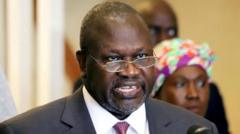Is South Sudan's Vice President Facing Murder and Treason Charges?

Published: 2025-09-11 16:00:11 | Category: world
Riek Machar, South Sudan's First Vice-President, has recently been charged with serious crimes including murder, treason, and crimes against humanity. These developments have raised concerns that tensions may escalate, potentially reigniting civil war in a country that has already endured significant turmoil. The charges stem from a militia attack linked to Machar, highlighting ongoing ethnic tensions and a fragile political landscape.
Last updated: 26 October 2023 (BST)
Background and Context
Riek Machar has been a prominent figure in South Sudan's political sphere, especially during the country’s protracted civil war, which lasted from 2013 to 2018. His relationship with President Salva Kiir has been tense, with both leaders representing different ethnic groups. The civil war resulted in catastrophic humanitarian consequences, with reports indicating nearly 400,000 deaths, massive displacement, and widespread atrocities. Although a peace agreement was signed in 2018, the road to stability has been rocky, and the latest developments threaten to unravel the fragile peace.
Key Takeaways
- Riek Machar faces charges of murder, treason, and crimes against humanity.
- The charges relate to a militia attack in March 2023.
- Since March, Machar has been under house arrest amid heightened tensions.
- The situation has sparked fears of renewed civil conflict in South Sudan.
- International bodies are calling for restraint and dialogue.
Recent Developments
Justice Minister Joseph Geng Akech announced the charges against Machar, which have led to significant military presence around his residence in Juba. The government’s actions, including blocking roads with tanks and soldiers, indicate the seriousness of the situation. While the government asserts that order must be maintained, critics worry that such measures may provoke further unrest.
The March Attack
The charges are centred on a violent incident in March, when a militia reportedly linked to Machar launched an attack. Official statements have indicated that this militia acted with a degree of autonomy, complicating the narrative around Machar’s involvement. This incident has been viewed as a flashpoint in the ongoing tensions, illustrating the volatility of the political environment.
Impact on Peace Process
The 2018 peace agreement was a significant milestone for South Sudan, yet its implementation has faced numerous challenges. Machar's charges could undermine the fragile coalition government formed under this deal. As ethnic tensions remain high, the potential for violence escalates with each passing day.
Ethnic Tensions and Political Dynamics
South Sudan's political landscape is heavily influenced by ethnic divisions, primarily between the Dinka and Nuer communities. Machar is from the Nuer ethnic group, while Kiir is a Dinka. This divide has historically fuelled conflict, and the recent charges against Machar may exacerbate these existing tensions. The fear is that if Machar is seen as a martyr or a victim of political manoeuvring, it could galvanise his supporters and lead to widespread unrest.
International Response
The international community, including the United Nations and the African Union, has expressed deep concern over the developments. Calls for dialogue and restraint are being echoed by neighbouring countries, urging both Machar and Kiir to navigate this crisis without reverting to violent conflict. The situation remains fluid, and the international response will likely play a crucial role in determining the future of peace in South Sudan.
What Happens Next?
The immediate future is uncertain. If Machar is formally tried and found guilty, it could lead to further unrest among his supporters and worsen the already strained relationship with the Kiir government. Conversely, if the charges are dismissed or if Machar is released, it might lead to a temporary easing of tensions. However, the underlying issues remain, suggesting that without substantial political reform and reconciliation, the peace process will continue to be at risk.
The Role of the Military
The military presence surrounding Machar's residence is a significant indicator of the government's approach to this situation. Historically, security forces in South Sudan have been heavily politicised. Analysts suggest that the military could play a pivotal role in either stabilising the situation or exacerbating it, depending on their loyalty to Kiir or Machar. Understanding the military's position will be crucial in assessing the potential for future conflict.
Public Sentiment and Civil Society
The public's reaction to Machar's charges is varied. Some see him as a legitimate leader fighting for their rights, while others view him as part of the problem that has plagued South Sudan. Civil society organisations have been vocal about the need for accountability and justice, but they also caution against actions that could provoke further violence.
Challenges Facing Peace Efforts
Several challenges hinder the peace process in South Sudan, including:
- Weak governance and institutional corruption.
- The absence of trust between political leaders and their constituencies.
- Lack of economic opportunities, fuelling resentment.
- Continued violence from various armed groups.
Conclusion
The recent charges against Riek Machar signal a critical juncture for South Sudan. The potential for renewed civil conflict looms large, stressing the need for urgent dialogue and reconciliation. As the situation develops, the eyes of the world will remain on South Sudan, where the hopes of millions hang in the balance.
Could this be the tipping point for a return to violence, or will it spur a renewed commitment to peace? Only time will tell. #SouthSudan #RiekMachar #PeaceProcess
FAQs
What are the charges against Riek Machar?
Riek Machar has been charged with murder, treason, and crimes against humanity related to a militia attack in March 2023.
Why is the situation in South Sudan critical now?
The recent charges against Machar have raised fears of renewed conflict amidst ongoing ethnic tensions and a fragile peace agreement.
What was the outcome of the 2018 peace deal?
The 2018 peace deal aimed to end the civil war but has faced challenges, with ongoing violence and political instability since its implementation.
How has the international community responded?
The international community, including the UN and African Union, has called for calm and dialogue, urging both leaders to avoid escalating tensions.
What is the historical context of the conflict in South Sudan?
The conflict in South Sudan has roots in ethnic divisions, primarily between the Dinka and Nuer communities, leading to violence and civil war since the country's independence in 2011.



